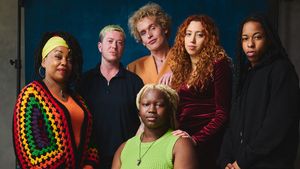
Treatment GuideJust DiagnosedSex & DatingAfrican AmericanStigmaAsk the HIV DocPrEP En EspañolNewsVoicesPrint IssueVideoOut 100
CONTACTCAREER OPPORTUNITIESADVERTISE WITH USPRIVACY POLICYPRIVACY PREFERENCESTERMS OF USELEGAL NOTICE
© 2025 Pride Publishing Inc.
All Rights reserved
All Rights reserved
Scroll To Top
By continuing to use our site, you agree to our Privacy Policy and Terms of Use.
Just what is the best way to slow the rate of new HIV infections? If prevention messages directed toward uninfected individuals are not driving them to embrace safer-sex practices or to take precautions while injecting drugs, is it time to shift the burden of responsibility toward people who are infected? For the researchers and clinicians involved in HIV prevention, this target shift is a significant marker of the political and medical evolution of the disease. It was not by chance that prevention messages initially targeted people who were HIV-negative. In failing to see those messages work wonders (with a consistent 40,000 new U.S. infections each year over the past decade), it is not just a quick-fix plan that is making 'prevention for positives''putting HIVers in the hot seat for protecting the rest of the nation'a prominent focus of HIV prevention and research efforts. When AIDS first struck, initial public and government reaction to the disease'fear, demonization, and calls for criminalization'led activists and public-health experts to focus prevention efforts on those who were HIV-negative. 'People were afraid to develop prevention programs aimed at positive people because they were afraid to further stigmatize them,' says Perry N. Halkitis, Ph.D., a codirector of the Center for HIV/AIDS Educational Studies and Training at New York University. 'They felt that positive people were already experiencing an undue burden living with HIV. And as a result they didn't want to impose on their lives any more.' Shifting the Burden This sentiment of not imposing on HIVers marked the first 15 years of the epidemic. But in 1996, with the advent of antiretroviral therapy, it quickly became clear that the course of the disease was changing. An HIV diagnosis had been transformed'at least in the United States'from a death sentence into a chronic but manageable condition. And as men and women found themselves looking and feeling better, their entire lives, including their sexual lives, changed. These changes took everyone, including prevention experts, by surprise. Not only did people not expect the results of antiretroviral therapy 'to be as dramatic and sustained,' says Tom Coates, Ph.D., director of the Center for AIDS Prevention Studies and the AIDS Research Institute at the University of California, San Francisco, 'no one anticipated the fact that unsafe sexual behavior was going to increase' as a result of the new medications. But it did. And with unsafe sex on the rise, the prevention messages that activists and public-health experts had long feared would be stigmatizing suddenly had become a necessity. And surprisingly, some HIV-positive people are ready to hear them. 'I can't tell you that when I seroconverted in 1994 I would have been ready to have these conversations,' says Keith Folger, program manager for Positive Force, an outreach to HIV-positive gay and bisexual men run by the San Francisco'based Stop AIDS Project. 'And not just because I had just seroconverted. I had been working on this issue since 1985. But I think the new medications have provided a great deal of leverage. The same thing that is contributing to some young guys going out and getting infected is also what gave us our strength to say we're tired of not talking about this and why doesn't everyone wake up and realize that one of us has to be present every time somebody gets infected?' New Tactics Arise That is precisely the message being conveyed by HIV Stops With Me, an HIV prevention campaign that began nearly three years ago in San Francisco. Some key aspects of the collaboration, which includes Positive Force, are posters, Web sites, chat rooms, and community forums that feature HIV-positive individuals who speak openly about their status and their role in stopping HIV transmission. Since its launch in San Francisco, the campaign also has been established in other California locations'Los Angeles, Long Beach, Orange County, and West Hollywood'as well as in Boston [see HIVStopsWithMe.org and PosImages.com]. HIV Stops With Me spokesman Terry Wilcox, 43, of Long Beach, says placing some of the responsibility for HIV prevention with those infected with the virus is a no-brainer. 'We're the only people who can spread it,' he says. 'And I don't want anybody else to have to go through what I've had to go through with disability and different medications and things, especially when this is preventable.' Wilcox and fellow campaign participants Agapito Velez, 37, also of Long Beach, and Rocio Velasquez, 32, of Santa Ana, Calif., all say that HIV-positive people should be encouraged to protect their sex partners'and none feel that being publicly urged to do so further stigmatizes people infected with the virus. In fact, Velez believes that visibly putting HIV-positive people at the forefront of prevention efforts helps strip away the stigma. 'One good thing I think is coming from the campaign is making being HIV-positive more normal and making HIV-positive people more accessible,' Velez explains.' 'I'm hoping it gets to the point where HIV-positive people don't have to hide and lie about it.' Governments Lend a Hand To get the word out about the need for programs like HIV Stops With Me, the Centers for Disease Control and Prevention made prevention for positives a high priority in its 2001 HIV Prevention Strategic Plan. 'The message we were sending to our partners and the health departments and community-based organizations that we fund was and is that they really do need to put an appropriate level of focus on people living with HIV,' says Ronald Valdiserri, MD, MPH, deputy director of the CDC's National Center for HIV, STD, and TB Prevention. That message was heard. In 1999 only one third of the CDC's health-department HIV-prevention grant applications identified people living with HIV as a priority population. Two years later the number increased to nearly 58%. Some state health departments and local grant makers have also begun pushing for prevention for positives. AIDS Partnership California, for example, has decided to focus its grant making primarily on prevention for positives in communities of color. And in 2001 the California Department of Health Services issued a mandate, effective in July 2002'believed to be the first and only one of its kind'requiring all local jurisdictions to spend up to 25% of their AIDS funding for HIV-positive prevention services. Researchers say a variety of prevention for positives programs will be needed, and throughout the country efforts are under way to evaluate which programs and messages work best. One area in which the CDC is especially interested is the role providers can play in prevention. 'Ongoing research shows that there are missed opportunities in medical care settings, even if it's only a very basic message about practicing safer sex or being tested periodically for sexually transmitted diseases,' says Valdiserri. And while he acknowledges that a lot is already being asked of providers, Valdiserri says it would be wrong to ignore that 'the medical care system has the potential to deliver messages to those already under care for their HIV disease.' Going to the Source Direct-service programs also provide unique opportunities for prevention. Wisconsin is evaluating the success of prevention case-management programs that have been initiated in cities throughout the state. And in Illinois, Chicago House, which provides housing and social services for HIV-positive men and women, has begun integrating prevention for positives into its own case-management program. 'The prevention message is about using condoms,' says Judy Perloff, program director at Chicago House, 'but it is also about other things you can do to keep yourself healthy and well'like making sure you take your medications and go to your doctor appointments as well as learning how to disclose your status to a potential partner.' Les Pappas, president of Better World Advertising, which created the HIV Stops With Me campaign for San Francisco's health department, says that while he was aware from the outset that focusing the prevention spotlight on those infected with the virus was 'kind of dicey,' he also knew that a lot of HIV-positive people were ready to take part in prevention. 'I think of it as the silent majority,' he says. 'Most people who are HIV-positive are very conscientious and very responsible and very concerned about other people. At the time the campaign was launched we were hearing a lot about barebacking [sexual intercourse intended to not use protective measures] and about people being irresponsible, and this campaign was in contrast to that. It makes a very positive statement about people who are HIV-positive.' It was a statement that Lee Jewell, for one, had been waiting a long time to hear. And it is a message he is now promoting as a member of the Positive Force advisory group. 'I think people have adopted a 'don't ask, don't tell' policy around disclosure and are leaving it up to everybody to take care of themselves,' says Jewell, who has been HIV-positive since 1986. 'And I think that is really wrong. I think we all need to take responsibility for ourselves and the person that we are with and have a discussion about what it is we like and what it is we want to do and what risks we are willing to take. What we are really talking about is creating a healthier community'psychologically, physically, and emotionally.' 'With additional reporting by Bob Adams
From our Sponsors
Most Popular
Lexi Love comes out as HIV+ after Trump deletes federal resources
January 23 2025 11:23 AM
Grindr is reminding us why jockstraps are so sexy and iconic
May 02 2025 5:36 PM
BREAKING NEWS: Trump admin moves to end federal HIV prevention programs
March 18 2025 6:10 PM
Trump's orders prompt CDC to erase HIV resources
January 31 2025 5:29 PM
Celebrating Black History Month with our annual African American issue
February 01 2025 3:28 PM
Tyler TerMeer vows to continue to fight for health care for all
January 28 2025 3:00 PM
Discover the power of Wellness in your life
March 26 2025 12:41 PM
Plus: Featured Video
Latest Stories
Dancer. Healer. Survivor. DéShaun Armbrister is all of the above
July 02 2025 8:23 PM
Two right-wing Supreme Court justices signal they may uphold access to PrEP and more
April 21 2025 4:10 PM
Broadway's best raise over $1 million for LGBTQ+ and HIV causes
April 03 2025 7:15 PM
Plus nominated for 2025 GLAAD Media Award
January 22 2025 12:42 PM
'RuPaul's Drag Race' star Trinity K Bonet quietly comes out trans
December 15 2024 6:27 PM
AIDS Memorial Quilt displayed at White House for the first time
December 02 2024 1:21 PM
BREAKING: Supreme Court rules to save free access to preventive care, including PrEP
June 27 2025 10:32 AM
1985: the year the AIDS crisis finally broke through the silence
June 26 2025 11:24 AM
Trump admin guts $258 million in funding for HIV vaccine research
June 03 2025 3:47 PM
500,000 Children at Risk: PEPFAR Funding Crisis
April 08 2025 3:51 PM
The Talk Season 5 premieres this spring with HIV guidance for the newly diagnosed
March 26 2025 1:00 PM
Jess King is here to help you live your happiest, healthiest life yet
March 24 2025 4:35 PM
A camp for HIV-positive kids is for sale. Here's why its founder is celebrating
January 02 2025 12:21 PM
VIDEO: A man living with HIV discusses his journey to fatherhood
June 10 2025 4:58 PM
HRC holds 'die-in' to protest Trump health care cuts
April 28 2025 2:11 PM
Season 4 of The Switch on resilience & radical self-love returns this spring
March 26 2025 12:20 PM
Gerald Garth is keeping people of color happy and healthy through trying times
March 11 2025 3:38 PM
This long-term HIV survivor says testosterone therapy helped save his life.
December 16 2024 8:00 PM
Ricky Martin delivers showstopping performance for 2024 World AIDS Day
December 05 2024 12:08 PM












































































